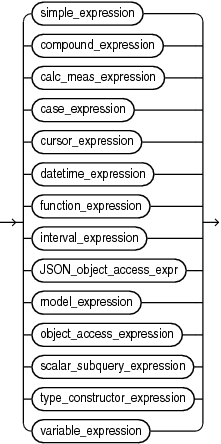About SQL Expressions
An expression is a combination of one or more values, operators, and SQL functions that evaluates to a value. An expression generally assumes the data type of its components.
This simple expression evaluates to 4 and has data type NUMBER (the same data type as its components):
2*2
The following expression is an example of a more complex expression that uses both functions and operators. The expression adds seven days to the current date, removes the time component from the sum, and converts the result to CHAR data type:
TO_CHAR(TRUNC(SYSDATE+7))
You can use expressions in:
-
The select list of the
SELECTstatement -
A condition of the
WHEREclause andHAVINGclause -
The
CONNECTBY,STARTWITH, andORDERBYclauses -
The
VALUESclause of theINSERTstatement -
The
SETclause of theUPDATEstatement
For example, you could use an expression in place of the quoted string 'Smith' in this UPDATE statement SET clause:
SET last_name = 'Smith';
This SET clause has the expression INITCAP(last_name) instead of the quoted string 'Smith':
SET last_name = INITCAP(last_name);
Expressions have several forms, as shown in the following syntax:
expr::=
Oracle Database does not accept all forms of expressions in all parts of all SQL statements. Refer to the section devoted to a particular SQL statement in this book for information on restrictions on the expressions in that statement.
You must use appropriate expression notation whenever expr appears in conditions, SQL functions, or SQL statements in other parts of this reference. The sections that follow describe and provide examples of the various forms of expressions.
